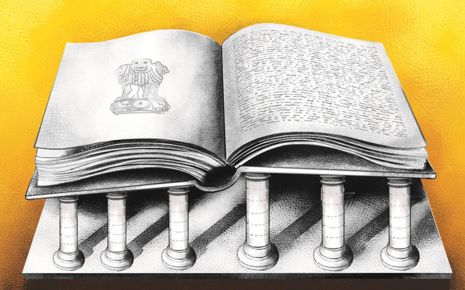Religion-Based Reservations: Secularism's Conundrum
The debate around religion-based reservations in India is a complex issue that
has been reignited during the election season. The discussion revolves around
the constitutional validity and socio-political implications of providing
reservations based on religion, particularly for Muslims. The issue raises
questions about the compatibility of religion-based reservations with the
secular principles enshrined in the Indian Constitution.
Understanding religion-based reservations within the framework of India's constitutional secularism holds paramount importance due to its ramifications on equality, social justice, and the sacrosanct principles of secularism enshrined in the Indian Constitution. The discourse surrounding this matter necessitates a meticulous scrutiny of historical precedents, constitutional provisions, and societal contexts to ensure parity and inclusivity for every citizen.
Crucial Aspects:
Moreover, proponents contend that religion-based reservations are consonant with the constitutional mandate of accommodating diversity within the ambit of secularism.
By acknowledging and addressing the socio-economic vulnerabilities of religious minorities, reservations based on religion are posited as an embodiment of secularism's commitment to pluralism and social justice.
From this standpoint, religion-based reservations are perceived as a means of redressing systemic injustices and fostering societal cohesion by ensuring equitable representation and opportunities for all religious communities.
These practical implementations reflect a nuanced understanding of the socio-political landscape, wherein religion-based reservations are perceived as indispensable tools for addressing entrenched socio-economic disparities among religious minorities. However, the efficacy and legitimacy of such reservations are subject to scrutiny and legal challenges, underscoring the intricate interplay between constitutional principles, societal exigencies, and judicial interpretations.
Secularism and Reservation:
High court rulings have upheld the legitimacy of religion-based reservations, stating that they do not necessarily conflict with India's secularist principles. The focus is on providing opportunities for social upliftment and addressing historical injustices rather than promoting or privileging any particular religion.
The debate[3] around religion-based reservations in India is a complex issue that requires a nuanced understanding of constitutional provisions, historical precedents, and societal contexts. While some argue that religion-based reservations are a violation of secularism, others maintain that they are an extension of the principle of equity and affirmative action. The ongoing discourse around this issue underscores the need for continued dialogue and engagement to ensure fairness and equality for all citizens.
End-Notes:
Understanding Reservation in India:
Reservation in India has evolved from the principle of formal equality to that of equity, ensuring fairness and differential treatment for historically disadvantaged groups. The Constitution of India, through Articles 15(4) and 16(4), mandates affirmative action for socially and educationally backward classes, including Scheduled Castes (SCs), Scheduled Tribes (STs), and other marginalized groups.Understanding religion-based reservations within the framework of India's constitutional secularism holds paramount importance due to its ramifications on equality, social justice, and the sacrosanct principles of secularism enshrined in the Indian Constitution. The discourse surrounding this matter necessitates a meticulous scrutiny of historical precedents, constitutional provisions, and societal contexts to ensure parity and inclusivity for every citizen.
Crucial Aspects:
- Constitutional Legitimacy: The Constitution of India, transitioning from the doctrine of formal equality to that of equity, empowers the state to institute special provisions for socially and educationally backward classes, encompassing Other Backward Classes (OBCs), Scheduled Castes (SCs), and Scheduled Tribes (STs), through Articles 15(4) and 16(4).
- Secularism and Equitability: Religion-based reservations pose a challenge to the foundational tenet of secularism by advocating for disparate treatment predicated on religious affiliation, thus prompting inquiries into the congruence of such reservations with the secular ethos of the nation.
- Historical Precedents: The inception of religion-based reservations in select states such as Kerala, Karnataka, Tamil Nadu, Andhra Pradesh, and Telangana reflects a convoluted interplay of social deprivation, historical injustices, and affirmative action policies.
- Social Justice and Inclusiveness: The deliberation underscores the imperative of striking a balance between the constitutional imperatives of secularism, equality, and justice and the pragmatic necessity of uplifting socially and educationally deprived communities across religious demarcations.
- In-depth Analysis: Insights gleaned from legal luminaries like Professor Bilgrami underscore the imperative of a nuanced comprehension of secularism, pluralism, and their application within India's heterogeneous and multi-religious societal fabric.
- Future Discourse: The ongoing conversation on religion-based reservations lays the groundwork for further deliberations on the interpretation and execution of these policies to ensure impartiality, parity, and societal advancement within a secular and democratic framework.
Religion-Based Reservations: Theory and Practice:
Reservations grounded in religion constitute a contentious aspect of Indian socio-political discourse, entailing both theoretical underpinnings and practical implementations. This section delineates the theoretical rationale and practical manifestations of religion-based reservations, encapsulating their complexities within the broader framework of India's constitutional secularism.Theoretical Underpinnings:
The foundational rationale for religion-based reservations emanates from the imperative to rectify historical injustices and socio-economic disparities afflicting religious minorities, particularly Muslims[1], in India. Proponents argue that reservations predicated on religion serve as a remedial mechanism to ameliorate entrenched socio-economic backwardness, thereby fostering inclusivity and equitable socio-economic progress. This perspective resonates with the overarching ethos of affirmative action enshrined in the Indian Constitution, aimed at uplifting marginalized communities and ensuring substantive equality.Moreover, proponents contend that religion-based reservations are consonant with the constitutional mandate of accommodating diversity within the ambit of secularism.
By acknowledging and addressing the socio-economic vulnerabilities of religious minorities, reservations based on religion are posited as an embodiment of secularism's commitment to pluralism and social justice.
From this standpoint, religion-based reservations are perceived as a means of redressing systemic injustices and fostering societal cohesion by ensuring equitable representation and opportunities for all religious communities.
Practical Implementations:
The translation of theoretical justifications into practical policies manifests in diverse forms across different states in India. Kerala, for instance, introduced a sub-quota for Muslims within the Other Backward Classes (OBC) quota, recognizing their historical backwardness stemming from caste-like divisions. Similarly, Karnataka has acknowledged numerous Muslim castes as backward and integrated them into the OBC quota under successive state governments' policies. Tamil Nadu, Andhra Pradesh, and Telangana have explored various mechanisms to extend reservations to Muslims based on their socio-economic and educational backwardness.These practical implementations reflect a nuanced understanding of the socio-political landscape, wherein religion-based reservations are perceived as indispensable tools for addressing entrenched socio-economic disparities among religious minorities. However, the efficacy and legitimacy of such reservations are subject to scrutiny and legal challenges, underscoring the intricate interplay between constitutional principles, societal exigencies, and judicial interpretations.
Arguments in Favor of Religion-Based Reservations:
- Addressing Socio-Economic Backwardness: The Sachar Committee Report underscores the deep-rooted socio-economic disparities faced by Muslims in India. Reservations, tailored to their specific needs, can serve as a crucial mechanism to bridge this gap, facilitating their integration into mainstream socio-economic spheres.
- Constitutional Mandate for Equity: The foundational principles of the Indian Constitution mandate affirmative action to uplift socially and educationally backward classes, irrespective of religious affiliations. Religion-based reservations, when justified by socio-economic metrics, align with this constitutional obligation, ensuring equitable opportunities for all marginalized communities.
- Ensuring Representation and Inclusion: Reservations based on religion can act as a vehicle for ensuring adequate representation and inclusion of underrepresented religious groups in critical domains such as education, employment, and governance. By providing a level playing field, these measures foster diversity and pluralism, enriching the fabric of Indian society.
Arguments Against Religion-Based Reservations:
-
Challenges to Secularism: Critics contend that religion-based reservations contradict the foundational tenet of secularism, which advocates for the state's neutrality in matters of religion. Such policies risk entrenching religious identities in state affairs, potentially undermining the secular fabric of the nation.
-
Threats to National Unity: Introducing reservations based on religion runs the risk of exacerbating inter-community tensions and divisions, posing a threat to national unity and social cohesion. By accentuating religious fault lines, these measures may inadvertently fuel communalism and hinder efforts towards building a harmonious society.
-
Advocating Economic Criteria: Opponents argue for a shift towards reservations solely based on economic indicators rather than religious affiliations. By prioritizing economic disadvantage as the primary criterion, reservation policies can ensure that benefits are directed towards those most in need, irrespective of their religious background.
- Navigating Administrative Complexities: Implementing religion-based reservations poses significant administrative challenges, including defining eligibility criteria, preventing misuse, and ensuring transparency in allocation. Such complexities underscore the practical difficulties in operationalizing these policies effectively.
Constitutional and Judicial Insights:
The Supreme Court of India has clarified through various judgments that reservations can extend to groups, including religious communities, if they are socially and educationally backward. This interpretation aligns with the principle of substantive equality, aiming to address historical disadvantages faced by certain groups.Secularism and Reservation:
High court rulings have upheld the legitimacy of religion-based reservations, stating that they do not necessarily conflict with India's secularist principles. The focus is on providing opportunities for social upliftment and addressing historical injustices rather than promoting or privileging any particular religion.
Future Prospects and Challenges:
- The landscape of reservation in India continues to evolve, with ongoing legal, social, and political debates influencing the application and expansion of reservation policies.
- The key challenge remains in balancing the constitutional mandates of secularism, equality, and justice with the practical needs for social upliftment of various backward communities across religious lines.
Constitutional Background:
- The Constitution of India shifted from the concept of formal equality to equity, ensuring fairness and differential treatment for historically disadvantaged groups.
- The Supreme Court has emphasized that equality is a dynamic concept, not confined to traditional limits.
- The Constitution dropped the term 'minorities' from Article 296 but included Article 16(4), enabling the state to make reservations for backward classes.
- The first constitutional amendment introduced Article 15(4), empowering the state to make special provisions for the advancement of socially and educationally backward classes and Scheduled Castes and Scheduled Tribes.
Historical Precedents:
- Religion-based reservation was first introduced in Travancore-Cochin state in 1936, replaced by communal reservation in 1952, and later included within the OBC quota in Kerala and Karnataka.
- In 1995, the Karnataka government implemented a 4% Muslim reservation within the OBC quota.
- Tamil Nadu, Andhra Pradesh, and Telangana have also considered providing reservation to Muslims based on their social, economic, and educational backwardness.
The debate[3] around religion-based reservations in India is a complex issue that requires a nuanced understanding of constitutional provisions, historical precedents, and societal contexts. While some argue that religion-based reservations are a violation of secularism, others maintain that they are an extension of the principle of equity and affirmative action. The ongoing discourse around this issue underscores the need for continued dialogue and engagement to ensure fairness and equality for all citizens.
End-Notes:
- https://www.drishtiias.com/daily-updates/daily-news-analysis/issue-of-reservation-for-muslims-in-andhra-pradesh
- https://indianexpress.com/article/explained/explained-law/expert-explains-the-muslim-quota-question-9312311/
- https://www.gktoday.in/debate-around-religion-based-reservations/
Law Article in India
Legal Question & Answers
Lawyers in India - Search By City
LawArticles
How To File For Mutual Divorce In Delhi

How To File For Mutual Divorce In Delhi Mutual Consent Divorce is the Simplest Way to Obtain a D...
Increased Age For Girls Marriage

It is hoped that the Prohibition of Child Marriage (Amendment) Bill, 2021, which intends to inc...
Facade of Social Media

One may very easily get absorbed in the lives of others as one scrolls through a Facebook news ...
Section 482 CrPc - Quashing Of FIR: Guid...

The Inherent power under Section 482 in The Code Of Criminal Procedure, 1973 (37th Chapter of t...
The Uniform Civil Code (UCC) in India: A...

The Uniform Civil Code (UCC) is a concept that proposes the unification of personal laws across...
Role Of Artificial Intelligence In Legal...

Artificial intelligence (AI) is revolutionizing various sectors of the economy, and the legal i...






Please Drop Your Comments